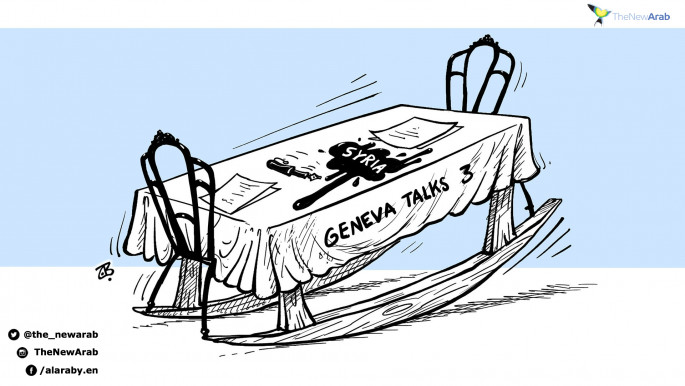Fears new Syria talks are 'stillborn' as regime escalates
For its part, the Syrian opposition High Negotiations Commission (HNC) focused on its key demand for a transitional executive governing body with full powers, insisting on discussing the key issue of the fate of Bashar al-Assad, and dismissing the "sham" regime elections that began on Wednesday in government-controlled parts of Syria.
In the meantime, Syria's deputy foreign minister Faisal Muqdad called on the opposition to "abandon the idea of a transitional government" in an interview with AP.
The continuation of the fighting on the ground in breach of a fragile UN-brokered ceasefire also put the talks in further doubt, with reports of a major regime offensive being prepared in southern Aleppo.
Syrian activists and state media reported an exchange of shelling in the northern city of Aleppo on the second day of the new round of peace talks in Geneva.
The Britain-based Syrian Observatory for Human Rights and Aleppo-based activist Bahaa al-Halaby said government warplanes, helicopter gunships and artillery have been bombarding rebel-held parts of the city on Thursday.
The pro-government Dounya TV reported one person was killed and five were wounded by mortar rounds fired by insurgents into the predominantly Kurdish Sheikh Maqsoud district of the city.
 |
Syrian activists and state media reported an exchange of shelling in the northern city of Aleppo on the second day of the new round of peace talks in Geneva |  |
Irreconcilable differences?
The HNC delegation urged UN Syria envoy Staffan De Mistura on Wednesday to pressure the Syrian government to end attacks on opposition-held areas and complete the cessation of hostilities, as well as allow aid into besieged areas and release detainees, sources close to the opposition told The New Arab.
While the delegation raised the issue of the transitional government as its key demand with the UN envoy on Wednesday, top Syrian regime official Faisal Muqdad told AP from Damascus that the opposition had to let go of its "dream" for a transitional government, saying that such a thing amounts to a coup d’état and "will never be accepted."
Deputy Foreign Minister Faisal Muqdad said most of the world with the exception of Saudi Arabia and Turkey — two strong backers of insurgents fighting to topple President Bashar al-Assad — have all but relinquished calls for the Syrian leader to step down, having realised after five years of war that he was fighting against "terrorists" in the country.
"This will not happen, not now, nor tomorrow nor ever," he said, in response to the opposition's calls for Assad's departure.
Instead, Muqdad, following in the footsteps of Assad, floated the idea of a national unity government that the opposition has previously rejected.
"We believe that if we have to proceed then we need to forget or we need others to forget the dreams they had for the last five years and to come with factual actual solutions to the problem," he said.
"This includes the possibility of establishing a national unity government or a broad government that includes members of the opposition."
Bleak outlook
"Bashar al-Assad is not a man of peace and does not want a political solution in Syria," the head of the opposition delegation Asaad Zoabi earlier told The New Arab in Geneva.
Zoabi reiterated the opposition's demand for a transitional government with full powers to take over from Assad who must step down, as he said.
On Wednesday, Syrians voted in a parliamentary election in government-held areas of the country in what they called a show of support for President Bashar al-Assad, while his opponents and Western powers denounced the polls as illegitimate.
The government said the vote was held to comply with the constitution, a view echoed by its Russian allies.
 |
|
 |
Syrians voted in a parliamentary election in government-held areas of the country in what they called a show of support for President Bashar al-Assad, while his opponents and Western powers denounced the polls as illegitimate |  |
The opposition, which wants the new peace talks to focus on a political transition, said the election was meaningless, while Britain and France called it a "flimsy facade" and a "sham."
The election went ahead independently of the UN-led peace process aimed at ending the five-year-old war. The divisive regime election, the seemingly irreconcilable differences over political transition and Assad's fate and the upsurge in fighting have thus darkened the already bleak outlook for a diplomatic solution.
Agencies contributed to this report





 Follow the Middle East's top stories in English at The New Arab on Google News
Follow the Middle East's top stories in English at The New Arab on Google News


